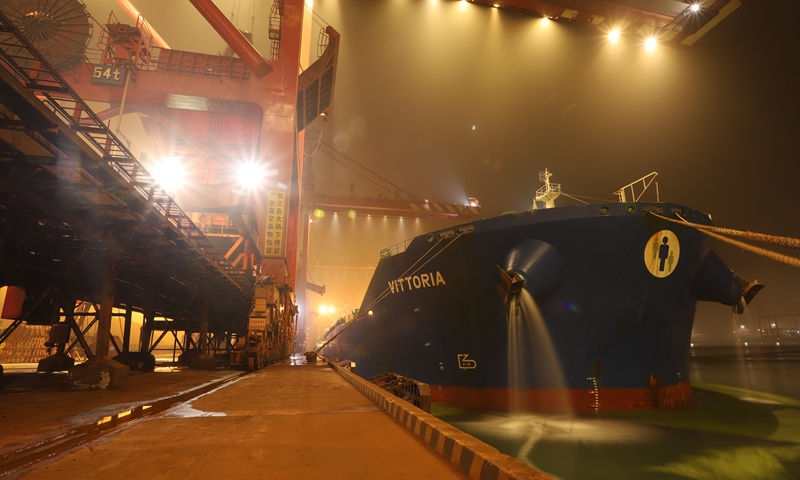
The vessel Vittoria loaded with iron ore from a mine in Western Australia arrives at Rizhao port, China's major iron ore trading port, on Sunday, two-weeks after departing Port Hedland. Photo: Courtesy of Shandong Port Group Co
Australian iron ore conglomerate BHP hailed on Sunday its first shipment of yuan-based spot trade iron ore to dock at a port in East China's Shandong Province, as Australian companies step up efforts to maintain businesses in the Chinese market amid tense bilateral relations due to Australia's hostile approach toward China.
The vessel Vittoria loaded with iron ore from a mine in Western Australia arrived at Rizhao port, China's major iron ore trading port, on Sunday, two-weeks after departing Port Hedland, according to a BHP statement on Sunday.
The arrival marks the official beginning of BHP's Shanghai branch, a wholly-owned subsidiary, since it was recently established to better serve clients in China, the largest iron ore importer in the world.
At the event to celebrate the ship's arrival on Sunday, Jeremie Louis, vice president of marketing and sales (Iron Ore) of BHP, said that the US dollar sales of iron ore and the spot market of the yuan in ports have their own characteristics and advantages and can complement each other and coexist, according to the official statement.
The launch of the yuan-based trade in iron ore marks an important step for the Australian company to get closer to the Chinese market, while balancing the possible risks and uncertainties from the US dollar ignited by high US inflation, industry insiders and experts said.
Overseas mines carrying out yuan settlement for spot trades at ports is helpful for the wider application of the yuan in commodity settlement and reduces the use of the greenback amid possible economic risks brought by huge exchange rate fluctuations to Chinese steel enterprises, Shandong Port Group Co, the operator of Rizhao Port, said in a statement sent to the Global Times on Monday.
Wang Guoqing, research director at Beijing Lange Steel Information Research Center, told the Global Times on Monday that yuan-settlement trade will not only enhance the bargaining power of domestic iron and steel enterprises on iron ore prices but also avoid the risk of exchange rate fluctuations, while ensuring profit margins and cost stability for enterprises.
Moreover, the market price of buyers and sellers will be relatively stable, measurable, and beneficial for the sustainable trade partnership, even though the US dollar is still the main currency for the iron ore trade at the moment, Wang said.
Moreover, experts noted, the yuan-settlement move is a reflection that Australian companies intend to get closer to the Chinese market amid rising expectations for improved relations after recent meetings between high-level government officials from both sides.
Australian firms understand they cannot always play by their own rules in business partnerships with Chinese clients, their largest global buyer, and the use of the Chinese yuan for trade is a positive change and will unleash greater potential for the iron ore trade with China, Chen Hong, president of the Chinese Association of Australian Studies and director of the Australian Studies Centre at East China Normal University, told the Global Times on Monday.
"It should be a consensus reached by both Chinese and Australian companies to balance the use of the dollar in trade for a more reliable and sustainable partnership, especially amid the high US inflation risks," Chen said.
Global Times




